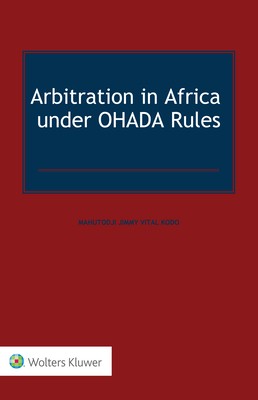
- We will send in 10–14 business days.
- Author: Mahutodji Jimmy Vital Kodo
- Publisher: Kluwer Law International
- ISBN-10: 9403509422
- ISBN-13: 9789403509426
- Format: 15.6 x 23.4 x 2.1 cm, hardcover
- Language: English
- SAVE -10% with code: EXTRA
Arbitration in Africa under OHADA Rules (e-book) (used book) | bookbook.eu
Reviews
Description
Increased international investment in African countries over recent decades has called for a harmonized legal environment across borders creating, inter alia, a modern arbitration system. The 1993 Treaty establishing the Organization for the Harmonization of Business Law in Africa (OHADA) took a giant step toward meeting this need and improved and consolidated its achievements with major arbitration-related revisions enacted in 2017 that came into force in 2018. This book, the first methodical analysis in English, describes in great detail the two distinct arbitration regimes--ad hoc and institutional--that characterize the system, equipping practitioners with everything they need to know to conduct arbitral proceedings efficiently in any of the OHADA's seventeen Member States.
OHADA's dual arbitration system manifests best practices and the core principles of international arbitration. Its specific features, including the following, are thoroughly analyzed in the book:
- ad hoc and institutional arbitration under the Uniform Act on Arbitration (UAA) and institutional arbitration administered by the Common Court of Justice and Arbitration under its Regulations on Arbitration (CCJA Arbitration Rules);
- implementation of these instruments by the courts of the Member States and the CCJA;
- types of persons who can resort to arbitration under the two arbitration regimes, including natural and legal persons and State Parties to the Treaty;
- types of disputes likely to be resolved by arbitration under the two arbitration regimes, including contractual and investment-related disputes;
- acceptance and validity of the arbitration agreement;
- remedies and recourse against arbitral awards; and
- effects of arbitration agreements, including foreign recognition and enforcement.
Throughout the book, the author cites cases and precedents of the CCJA as well as relevant decisions of lower courts. Also, the author has thoroughly revised and improved English translations of essential primary material which are included in the Appendices.
Over the past twenty years, the OHADA arbitration framework has been tried and tested in proceedings before arbitral tribunals, Member States' courts and the CCJA, as well as courts in Western countries in the context of enforcement proceedings. With this book, advisors and representatives of parties in the OHADA Member States will approach any relevant arbitration matter with full awareness of applicable rules of procedure. The book, a highly welcome bridge that connects the rest of the world with OHADA, will become an indispensable guide for arbitrators, counsels to parties, in-house counsels, government and State-owned entities, and academics in international arbitration.
EXTRA 10 % discount with code: EXTRA
The promotion ends in 18d.13:28:55
The discount code is valid when purchasing from 10 €. Discounts do not stack.
- Author: Mahutodji Jimmy Vital Kodo
- Publisher: Kluwer Law International
- ISBN-10: 9403509422
- ISBN-13: 9789403509426
- Format: 15.6 x 23.4 x 2.1 cm, hardcover
- Language: English English
Increased international investment in African countries over recent decades has called for a harmonized legal environment across borders creating, inter alia, a modern arbitration system. The 1993 Treaty establishing the Organization for the Harmonization of Business Law in Africa (OHADA) took a giant step toward meeting this need and improved and consolidated its achievements with major arbitration-related revisions enacted in 2017 that came into force in 2018. This book, the first methodical analysis in English, describes in great detail the two distinct arbitration regimes--ad hoc and institutional--that characterize the system, equipping practitioners with everything they need to know to conduct arbitral proceedings efficiently in any of the OHADA's seventeen Member States.
OHADA's dual arbitration system manifests best practices and the core principles of international arbitration. Its specific features, including the following, are thoroughly analyzed in the book:
- ad hoc and institutional arbitration under the Uniform Act on Arbitration (UAA) and institutional arbitration administered by the Common Court of Justice and Arbitration under its Regulations on Arbitration (CCJA Arbitration Rules);
- implementation of these instruments by the courts of the Member States and the CCJA;
- types of persons who can resort to arbitration under the two arbitration regimes, including natural and legal persons and State Parties to the Treaty;
- types of disputes likely to be resolved by arbitration under the two arbitration regimes, including contractual and investment-related disputes;
- acceptance and validity of the arbitration agreement;
- remedies and recourse against arbitral awards; and
- effects of arbitration agreements, including foreign recognition and enforcement.
Throughout the book, the author cites cases and precedents of the CCJA as well as relevant decisions of lower courts. Also, the author has thoroughly revised and improved English translations of essential primary material which are included in the Appendices.
Over the past twenty years, the OHADA arbitration framework has been tried and tested in proceedings before arbitral tribunals, Member States' courts and the CCJA, as well as courts in Western countries in the context of enforcement proceedings. With this book, advisors and representatives of parties in the OHADA Member States will approach any relevant arbitration matter with full awareness of applicable rules of procedure. The book, a highly welcome bridge that connects the rest of the world with OHADA, will become an indispensable guide for arbitrators, counsels to parties, in-house counsels, government and State-owned entities, and academics in international arbitration.


Reviews